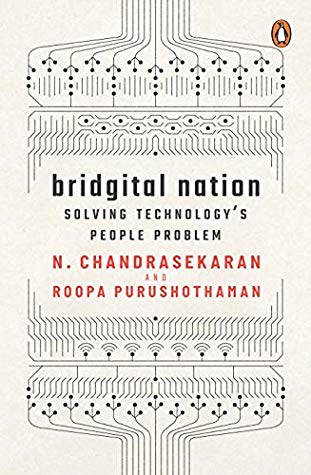Follow Nikhil… Every night, at 8.30 p.m., a crowd grows around his car outside of the City of Silchar in the State of Assam, India. His visitors are sick and urgently need his guidance to find the right doctor or hospital. For people from rural India, after hours and sometimes days of traveling, accessing the right health care providers is a daunting task.
This opening story plunges the reader into the part of India that is hardly visible as the country embarks into modernization, globalization with the help of a technology leadership second to none. The Bridgital Nation concept holds the key of pulling India out of this conundrum, transforming access challenge into an engine of employment generation.
The theme of the book weighs in on the current debate around the very meaning of economic progress — which was highlighted by this year’s Nobel Prize for economics for pioneers in poverty alleviation. Bridgital also resonates to the recent work of former Reserve Bank of India Governor Raghuram Rajan, The Third Pillar: How Markets and the State Are Leaving Communities Behind. The Bridgital authors are bringing Solving Technology’s People Problems into the discussion as did Thomas L. Friedman in Thank You for Being Late: An Optimist’s Guide in the Age of Acceleration.
Natarajan Chandrasekaran, the Chairman of the global corporate Tata Group is also the former CEO of Tata Consultancy Services, the third most valued global I.T. services company. Chandra, as he is called, is not just a business leader, he also deeply cares about the Indian people — and it feels throughout the book. The combination of the author’s experience, and the cooperation and research of his Chief Economist, Roopa Purushothaman, make this book unique. Exploring health care, education of talents for jobs, and entrepreneurship, the authors manage to combine a journey in individual and sometimes painful destinies with a vision on technology. The personal stories make the book reachable and lively, and provide a crucial context for the possibilities of tech.
By looking at ways of transforming India into a Bridgital Nation, Roopa and Chandra explore the gap between the rural world and the cities, as well as between technology and humanity. Even for non-Indians, people will find in this book essential clues to understand the resiliency and the resistance that the diversity of cultures, languages and religions creates in the Indian society.
The authors focus on three transformational requirements —Technology, Talent, and Vision, that create a pathway for governments, businesses, and everyday people. The book suggests a different way for Indians to think about themselves and their nation. India is difficult to pin down because of its idiosyncrasies among more than a billion individuals. The State of Uttar Pradesh has more people than Brazil. The sheer size of India’s challenges is mindboggling but supports the fascinating dynamics and potential of the country. It is the largest technology laboratory in the world.
In this undertaking, the role of Indian women is critical: 120 million of them have a secondary education, but are not part of the workforce. And the women who insist in working encounter obstacles. The criticism of their neighbors and sometimes the shame of their families are poignant because, on both sides, they are profoundly sincere but irreconcilable. In this context, how to address challenges through a reimagining of tasks and processes? How to liberate the insufficient number of doctors and surgeons from the time they spend in administrative duties through technology? Can deficient infrastructures be overcome through digital transformation?
This book is a fascinating and splendidly described journey through the multiple challenges India is facing. Building bridges is not optional: It is a question of survival. As I was finishing reading the book, it occurred to me that the book’s thesis might not only be true for India. The scope, size and diversity of the challenges in India can inspire other countries and regions. Aren’t many societies confronted, mutatis mutandis, with the same challenges of unparallel development? Without bridges, we abandon “the other side,” the less fortunate, rich, or educated. We are responsible for reducing the distance between those who understand, and those who are left behind.
What the book brings to this debate, is the experience of technology and of human realities, to which Chandra and Roopa bring their own views. The future of work will be imagined, designed, tested, and made in countries like India. In a broader sense, the book takes on one of the pivotal questions of our time: how to make technology a companion, rather than an enemy, of mankind.

Bridgital Nation: Solving Technology’s People Problem
by N Chandrasekaran (Author), Roopa Purushothaman (Author)
Foreword of Ratan N. Tata
Penguin Random House India (November 1, 2019), 304 pp.


